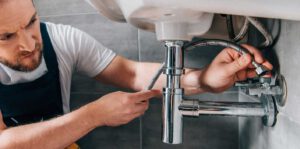A plumber is a professional who installs drainage and potable water systems. A plumber also works on sewage systems. They understand the importance of sewage systems and are trained to repair and install them. A plumber is trained to work in a professional, clean and safe environment. In addition to drains and pipes, plumbers also fix other plumbing problems.
A plumber must possess several important qualifications in order to practice his or her trade. Ideally, an individual must have at least a Certificate III in Plumbing and Services. However, many employers prefer those with higher qualifications. In order to achieve this, an individual can pursue a plumbing course at a trusted training provider. These courses are designed to equip individuals with a broad knowledge of plumbing systems.
Plumbing is a profession that demands excellent problem-solving and interpersonal skills. Plumbers must be meticulous, pay attention to details, follow verbal instructions, and have excellent listening skills. In addition, plumbers must have good manual dexterity and hand-eye coordination. They should also have a strong analytical mindset and be able to work in confined spaces.
Plumbers carry out a wide range of tasks in residential buildings, including installing and maintaining plumbing systems. They inspect water pipes and boilers, and they detect burst water pipes. They also install and repair common appliances like radiators. However, plumbers must have the right qualifications and be gas-safe registered to work on gas.
Plumbing technicians need to be skilled in reading blueprints, using plumbing tools, and resolving problems. They must also be able to communicate with clients and adhere to safety measures. Applicants should have a high school diploma or GED and must have completed an apprenticeship. In addition, they should be familiar with plumbing tools and have extensive knowledge of building codes.
In addition to the necessary skills and training, plumbing experts need to pass specific exams to qualify for a license. Various qualifications are required by different plumbers, ranging from basic to advanced. It is important to ask a plumber for his or her qualification papers and look for someone who meets these requirements.
A plumber needs seven years of experience in order to become a licensed professional. At least two years of that experience must be in the design and planning stage. Alternatively, an applicant can gain this balance of experience by performing maintenance, replacement, and repair projects on existing buildings. This experience can include working for a city agency or a plumber’s apprenticeship.
Plumbers are responsible for installing, repairing, and maintaining plumbing systems, as well as fixtures and appliances. They also supervise other construction workers who perform plumbing tasks. Plumbers’ earnings depend on their experience and the type of work they do. However, on average, plumbers earn more than other construction trade workers. Some plumbers belong to unions, which help negotiate wages and benefits.
Plumbers often work night and weekend shifts. This means that they must be available for emergencies. Job duties of plumbers often require extensive troubleshooting skills, strong manual dexterity, and the physical fitness to lift heavy pipes. Job growth for plumbers is expected to be around 15% between 2016 and 2026, which is faster than the average for all occupations. However, as the construction industry is dependent on the economy, plumbers’ employment outlook is dependent on the overall health of the economy.
Plumbers must travel to different locations each day to perform plumbing work. They may perform their work in homes, factories, or office buildings. Their work involves working in cramped spaces and in all types of weather conditions. Consequently, they often experience injuries while working on their jobs. In addition to long hours and weekends, plumbers typically work full-time. Most plumbers work forty hours a week and work overtime. In addition, they are required to be on call a certain amount of times each week, which means they work irregular hours and sometimes even weekends.
A plumber must have a license in order to practice his or her profession. Most states require a plumber to have a license in order to practice independently. To obtain a plumbing license, plumbers should have at least two years of experience. They should also have a high school diploma and be at least 18 years old. In addition to learning about local codes and regulations, plumbers should also be familiar with state and local laws regarding plumbing.
Plumbers must have a valid Missouri driver’s license. They should also possess a backflow prevention license. Plumbing work involves using hazardous chemicals, solvents, and cleaners. These substances can cause physical injury, so the job can be hazardous.

